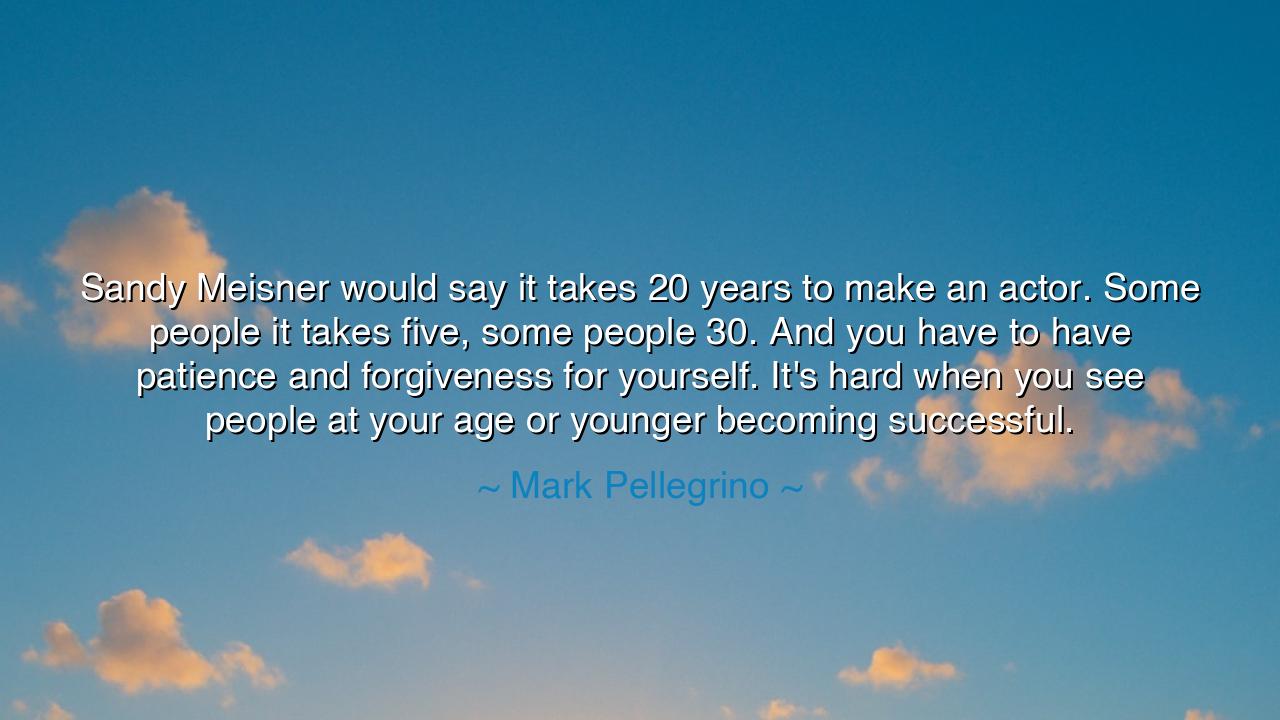
Sandy Meisner would say it takes 20 years to make an actor. Some
Sandy Meisner would say it takes 20 years to make an actor. Some people it takes five, some people 30. And you have to have patience and forgiveness for yourself. It's hard when you see people at your age or younger becoming successful.






In the words of Mark Pellegrino, drawing upon the wisdom of the great acting teacher Sandy Meisner, there is revealed a truth that resonates far beyond the stage: “Sandy Meisner would say it takes 20 years to make an actor. Some people it takes five, some people 30. And you have to have patience and forgiveness for yourself. It’s hard when you see people at your age or younger becoming successful.” These words, though spoken in the context of art, echo the eternal struggles of humanity: the long road of mastery, the torment of comparison, and the necessity of compassion for one’s own imperfect journey.
For what is an actor but one who embodies the stories of others, carrying the weight of human souls upon their shoulders? To craft such a vessel does not happen in haste. Just as the oak does not spring from the acorn overnight, so the artist does not reach his fullness in a year. Meisner’s teaching—that it may take decades to shape a true actor—is a reminder that mastery, in any field, is a slow alchemy of experience, discipline, and endurance. Pellegrino, in recalling this, speaks to all who struggle on the long path: greatness is not a sprint, but a pilgrimage.
Yet the road is not equal for all. Some may find their voice in five years, while others wander for thirty before the flame of craft burns steady. This is the mystery of human endeavor: each life has its own rhythm, each destiny its own pace. And herein lies the danger—when one sees others racing ahead, when one’s peers achieve success while one still toils unseen, envy and despair creep in like shadows. Pellegrino confesses to this universal pain: the ache of watching another, younger and less tested, ascend before you.
But here, he reminds us of the twin virtues: patience and forgiveness. Patience, for without it the heart corrodes with bitterness, unable to endure the slow unfolding of time. Forgiveness, for without it the soul devours itself with regret and self-condemnation. To forgive oneself is to accept that delay is not failure, that slowness is not weakness, but simply the measure of one’s unique journey. These are not easy virtues, but they are the keys to peace while the road stretches on.
Consider the story of Vincent van Gogh. In his own lifetime, he sold but a single painting, while others around him prospered and gained renown. Yet he painted still, with devotion and fire, forgiving himself for each day of obscurity, waiting with patience for his art to find its voice. Though he did not live to see his triumph, his work now sings across the centuries, a testament to endurance over despair. His story is a mirror of Pellegrino’s truth: that success cannot be measured only by the clock of comparison, but by the faithfulness of the artist to his craft.
The meaning of Pellegrino’s words is thus: that the road to mastery is long and uneven, but it is your road alone. To measure it against another’s is folly; to despise yourself for delay is poison. What matters is the persistence to walk forward, the patience to endure, and the forgiveness to rise when you falter. For every true calling—be it art, science, labor, or love—demands time, and time demands kindness of spirit.
The lesson for us is clear: cast away the chains of comparison. When others rise before you, bless them, and continue your own work with faith. Practice patience, knowing that growth unseen is still growth. Practice forgiveness, so that your failures do not turn to self-hatred but to lessons that shape your strength. Trust that your path, however long, is not wasted, for each step prepares you for the fullness of your becoming.
So live as the ancients counseled: slow to envy, rich in patience, generous in forgiveness. When you look upon your journey, do not count the years lost, but the wisdom gained. For in the end, whether it takes five years or thirty, what matters is not the speed of your arrival but the depth of your transformation. And in this truth lies the quiet triumph of every soul who dares to endure.






AAdministratorAdministrator
Welcome, honored guests. Please leave a comment, we will respond soon